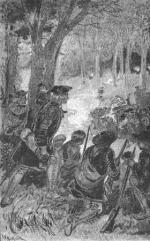![header=[Marker Text] body=[Three miles to the north, the French and Indian War began, on May 28, 1754, when a force of Virginians and Indians led by Col. George Washington defeated a French party under Jumonville, who was killed. ] sign](kora/files/1/10/1-A-93-139-ExplorePAHistory-a0a3r8-a_450.gif)
Mouse over for marker text
Name:
Jumonville Defeat
Region:
Laurel Highlands/Southern Alleghenies
County:
Fayette
Marker Location:
US 40 approximately 6 miles SE of Uniontown at Summit (Missing)
Dedication Date:
May 24, 1946
Behind the Marker
This marker, like the event it describes, leaves much to be explained. Ensign Joseph Coulon de Villiers, Sieur de Jumonville was the commander of a small French party sent out from Fort Duquesne to intercept the Virginia militia force then cutting its way through the woods to the Ohio Country. Jumonville was to avoid armed confrontation with the enemy, but deliver to them a warning that they were trespassing in French territory.
Jumonville delivered his message under less than ideal circumstances. When Washington learned that a French party was approaching, he took a small detachment and joined an Indian war party led by Tanacharisson to find the enemy. They surprised Jumonville's still sleeping encampment at dawn the next day, surrounding it in a rocky glen. In a brief exchange of fire, the Virginians killed or wounded about a dozen Frenchmen. Jumonville protested the attack, and though wounded, attempted to deliver his commander's message to Washington. He was cut short by Tanacharisson, who approached the wounded man and asked if he was an Englishman. When Jumonville replied that he was French, Tanacharisson split his skull with a blow from his tomahawk and reportedly washed his hands with the Frenchman's brains. [Original Document] The other Indians present killed and scalped the remaining French wounded. By taking these actions, Tanacharisson and his party made clear their disgust with the French for invading their homelands and their intention to side with the British in removing them. Washington, who lacked the experience and influence to have intervened, was badly shaken by this turn of events and headed back to
[Original Document] The other Indians present killed and scalped the remaining French wounded. By taking these actions, Tanacharisson and his party made clear their disgust with the French for invading their homelands and their intention to side with the British in removing them. Washington, who lacked the experience and influence to have intervened, was badly shaken by this turn of events and headed back to  Fort Necessity to rejoin his main force.
Fort Necessity to rejoin his main force.
The site of this violent and confused skirmish has since been known as Jumonville's Glen. The blood spilled there had repercussions throughout North America and Europe. The French interpreted Jumonville's murder as an act of war and used it to depict the British as aggressors in the brewing conflict over the Ohio Country.
Jumonville delivered his message under less than ideal circumstances. When Washington learned that a French party was approaching, he took a small detachment and joined an Indian war party led by Tanacharisson to find the enemy. They surprised Jumonville's still sleeping encampment at dawn the next day, surrounding it in a rocky glen. In a brief exchange of fire, the Virginians killed or wounded about a dozen Frenchmen. Jumonville protested the attack, and though wounded, attempted to deliver his commander's message to Washington. He was cut short by Tanacharisson, who approached the wounded man and asked if he was an Englishman. When Jumonville replied that he was French, Tanacharisson split his skull with a blow from his tomahawk and reportedly washed his hands with the Frenchman's brains.
The site of this violent and confused skirmish has since been known as Jumonville's Glen. The blood spilled there had repercussions throughout North America and Europe. The French interpreted Jumonville's murder as an act of war and used it to depict the British as aggressors in the brewing conflict over the Ohio Country.





